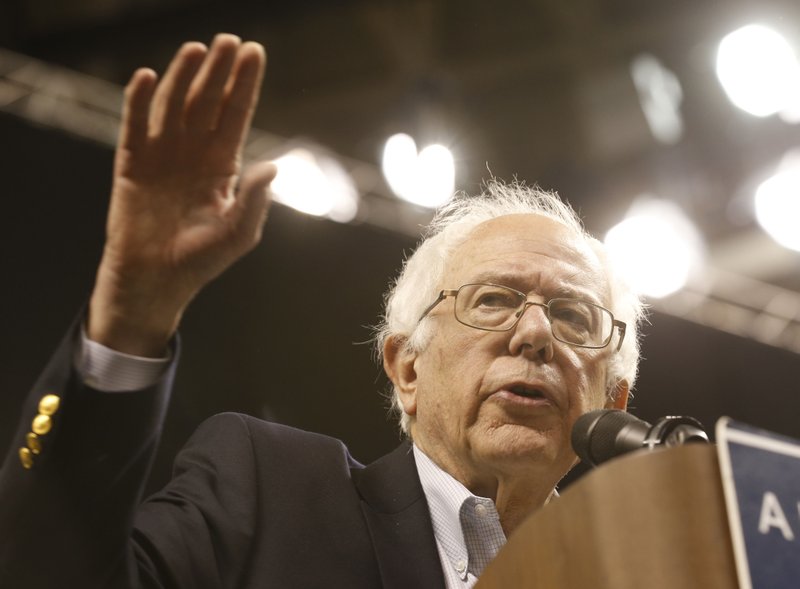WASHINGTON -- If the Democrats hand the presidential nomination to a self-described democratic socialist named Bernie Sanders, they'll pay for it come November, former U.S. Sens. Mark Pryor and Blanche Lincoln said Tuesday.
RELATED ARTICLES
http://www.arkansas…">Trump grabs Nevada lead in early going http://www.arkansas…">Trump, Cruz to arrive in NWA
FULL ELECTION COVERAGE
The "democratic socialist" label is "a major problem," Pryor said, predicting it will be an ugly Election Day with the senator from Vermont at the top of the ticket.
"I think Bernie Sanders would be a disaster for Democrats in Arkansas. I think that you'd see that because of him we'd lose seats in the House and the Senate, and I think that's probably true nationally, too," the Democrat said. "I just think if you call yourself a democratic socialist, then you're basically unelectable, not just in Arkansas but around the country."
Pryor, a Hillary Clinton supporter who lost his seat in 2014, served on Capitol Hill alongside the two Democratic presidential contenders.
"I worked with both of them, I know both of them, [I] like both of them, but she's electable in the fall, and he's not. It's a very simple equation, I think," Pryor said.
Lincoln, who also served with both candidates, said Sanders typically sided with Democrats but spurned the label. "Even though he caucused with the Democrats, he was quick to describe himself as a socialist," she said.
Early on he frequently referred to himself as a "socialist" without adding any qualifiers.
She sees trouble ahead for Democrats if Sanders isn't stopped.
"I think it would be tough for anyone in Arkansas or really throughout the entire South to win as a democratic socialist, so I think having him at the top of the ticket would be a tough thing. It'd be a tough thing for Democrats to be able to win the White House and I think it would have some very damaging effects on Democrats in the down-ballot races," she said.
Sarah Scanlon, state director of the Sanders campaign, dismisses the warnings.
"The only people who are trying to smear him with the socialist name are people who are supporting another candidate," she said.
She portrays Sanders as following in the footsteps of Franklin D. Roosevelt and says many American programs, including Medicare and Social Security, are socialistic.
"We work in social constructs on a regular basis in this great country. I mean, the fire department is a socialist construct, the police department is a socialist construct. Our education system is a socialist construct," she said, adding, "It's by the people, for the people."
In a November speech, Sanders explained his vision of democratic socialism, saying he doesn't envision the government taking control of "the means of production" -- creating a government-controlled economy.
Instead, he said, it means universal health care, sharply higher minimum wages, free college tuition and a system that addresses income inequality.
There's plenty of skepticism about socialism, a recent survey showed.
A Gallup poll, conducted in June, asked 1,527 Americans about their tolerance levels for various types of potential candidates. Ninety-two percent said they would vote for "a generally well-qualified" presidential nominee from their own party if he was black. Ninety-one percent said they'd back a well-qualified Jew; 74 percent a well-qualified gay; 60 percent a well-qualified Muslim and 58 percent said they'd vote for a well-qualified atheist.
But only 47 percent said they would back a well-qualified candidate who was a socialist.
The poll, which had an overall margin of error of 3 percent, found dramatically different tolerance levels for socialists, depending on age. Among young adults -- ages 18-29 -- 69 percent said they would back a socialist. That figure dropped to 34 percent for voters ages 65 and older.
"I think there is a generational gap in how the term socialism is perceived," said Ouachita Baptist University political science professor Hal Bass. "For those who have come of age in the post-Cold War, it's not the specter that it was and remains, I think, for Americans who grew up in the post-World War II Cold War era."
For decades, the United States and the Union of Soviet Socialist Republics battled for supremacy.
"For those who grew up in that polarized or binary Cold War system where it's capitalism or the alternative, socialism and communism kind of blended together," Bass said.
"It was an existential struggle and folks spent their formative years and much of their adult lives under the specter of, or under the sword of, nuclear annihilation. For younger folks there's not quite that sense of dread or even hatred that's associated with socialism," Bass said.
Western Europe, on the other hand, hasn't been as alarmed. France elected a socialist, Francois Mitterrand, as president in 1981. Socialists won power in Spain the next year. Other countries followed.
"It's something that I think most Arkansans would find very difficult to embrace," said former governor and current Clinton supporter Mike Beebe. "I think most Arkansans are a little bit or significantly more conservative than what they perceive to be socialism," he said.
Bass agrees, predicting that a Sanders victory would be a liability. "It would heighten the disadvantages that Democrats currently face in trying to compete in the Arkansas electorate. No question about it," he said.
A Section on 02/24/2016

